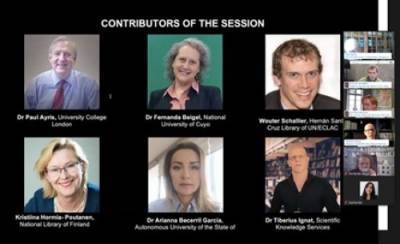Open Science in UCL crosses national boundaries
9 June 2022
Dr Paul Ayris outlines findings from two international webinars in June on Open Science/Scholarship, organised by the UCL Office for Open Science and in collaboration with UCL Press.

Scholarly Communication in Latin America and the Caribbean

There is a real difference in approach between Europe and the Global South. In Europe, Transformative Agreements which allow both reading of published outputs and publishing of outputs in Open Access are now the norm in Europe.
In Latin America and the Caribbean, Transformative Agreements are not seen as acceptable ways forward in developing Open Science approaches. Such agreements tend to ‘bake’ large payments to commercial publishers into the publishing landscape without effecting the transformation in publishing which Open Science/Scholarship expects. The Latin American approach is to look much more closely at Green Open Access and publishing platforms produced/maintained by universities, learned societies or consortia. For them, Diamond Open Access is the goal where there are no upfront costs for readers or for those publishing in Open Access.

Beyond Transformative Agreements
The second webinar, Beyond Transformative Agreements, on 2 June, saw a collaboration between the UCL Office for Open Science and the University of Stockholm. The webinar is the first of two funded in 2022 by UCL’s Cities Partnership Programme run by Innovation and Global Engagement in UCL RIGE (Research, Innovation and Global Engagement).
The webinar was opened by Professor Astrid Söderbergh Widding, President of Stockholm University, who asked ‘How can we transform the system of scholarly communications?’ Professor Widding noted that the cost of Transformative Agreements was still unreasonably high. She felt that the multiplicity of policy statements on Open Access, not all in agreement with each other, also posed problems for the movement because of a lack of clarity as to the way forward. In her presentation, the President was clear that academia needs to take back control over the publishing system, not continue to hand it over to commercial providers.
Gustav Nilsonne, a Researcher at Karolinska Institutet, gave a vivid example of what alternative publishing platforms might look like. He highlighted three crises with current commercial models: Reliability, Affordability and Functionality. Instead, Gustav advocated for a system, not of journals, but of digital research objects, interoperable through Open standards. Such a model is a mile away from Transformative Agreements and could revolutionize the scholarly communications process.
Conclusions
Both webinars ended with me, Paul Ayris, summarizing lessons learned from the day. I drew two main conclusions:
- In the Latin American webinar, it is clear that the global North and global South need to continue detailed discussions to agree ways forward which are open, collaborative and complementary;
- From the Swedish webinar, I drew the conclusion that it was too early to say that Transformative Agreements were an end in themselves. They have speeded the move to Open Access, but not all countries can afford to follow this route. It is still time to let a thousand flowers bloom to see what Open Science solutions work for differing institutions and bodies.
Each of the two webinars had 300 attenders and there was a lively exchange of ideas on Twitter using the hashtag #FocusOpenScience. Recordings of the events for those wishing to watch the webinars will appear shortly.
The UCL Office for Open Science will continue to offer global leadership in the Open Science debate and hopes to continue its collaborations with Latin America and with UCL’s Cities Partnership programme in 2023.
Paul Ayris
Pro-Vice-Provost (LCCOS)
 Close
Close

